

Wizard Tool for Searching. This tool is built on Google's Advanced Search and conducts a Google search with the keywords that you fill in for each field.
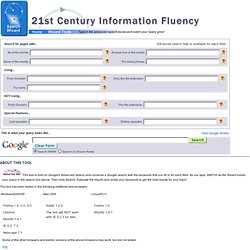
As you type, WATCH as the Wizard builds your query in the search box above. Then click Search. Evaluate the results and revise your keywords to get the best results for your topic! This tool has been tested in the following platforms and browsers: Some of the other browsers and earlier versions of the above browsers may work, but are not tested. top General Search Box Strategy: When you enter something in the search box, see what you get, and continue the process until you find what you are after, you are using the basic Search Box Strategy. Searchers who have refined the Search Box Strategy will think about what they need to find, carefully choose keywords based on that, do a preliminary search, scan the results for clues, and persistently revise search terms until they find what they seek. The C.R.A.P. Test in action: Websites. Step 4: Evaluating Sources - Getting Started Doing Research - LibGuides at University of Maine Farmington.
Books You can find scholarly books by looking for additional information about the book and the author.
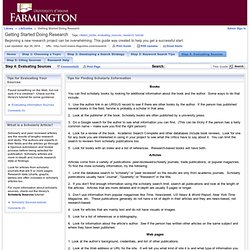
Some ways to do that include: 1. Use the author link in an URSUS record to see if there are other books by the author. If the person has published several books in the field, he/she is probably a scholar in that area. 2. 3. 4. 5. Articles Articles come from a variety of publications: peer-reviewed/scholarly journals, trade publications, or popular magazines. Developing a Search Strategy by Kelly Boivin on Prezi. Choosing a Research Topic by Kelly Boivin on Prezi. CS4HS - Pecha Kucha. PechaKucha 20x20. iPads (or other devices) and Literature Circles – co-starring Edmodo.
CC Licensed Literature Circles have been around forever.
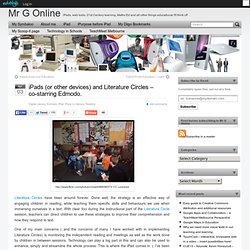
Done well, the strategy is an effective way of engaging children in reading, while teaching them specific skills and behaviours we use when immersing ourselves in a text. With clear foci during the instructional part of the Literature Circle session, teachers can direct children to use these strategies to improve their comprehension and how they respond to text. One of my main concerns ( and the concerns of many I have worked with in implementing Literature Circles) is monitoring the independent reading and meetings as well as the work done by children in between sessions. Technology can play a big part in this and can also be used to enhance, simply and streamline the whole process. To Tweet or Not to Tweet Over the past twelve years, I’ve watched my students progress from MySpace to Facebook to Twitter, not to mention the hundreds of other apps-of-the-moment.
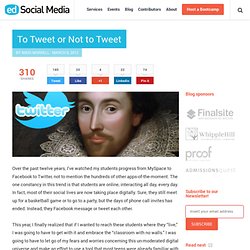
The one constancy in this trend is that students are online, interacting all day, every day. In fact, most of their social lives are now taking place digitally. Sure, they still meet up for a basketball game or to go to a party, but the days of phone call invites has ended. Instead, they Facebook message or tweet each other. Mashups in the Literature Classroom. Let me say right away that this post will focus on an exercise I’ve used in my literature classes.
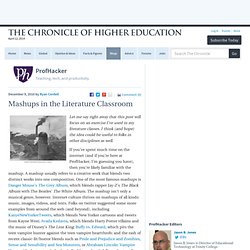
I think (and hope) the idea could be useful to folks in other disciplines as well. If you’ve spent much time on the internet (and if you’re here at ProfHacker, I’m guessing you have), then you’re likely familiar with the mashup. A mashup usually refers to a creative work that blends two distinct works into one composition. One of the most famous mashups is Danger Mouse’s The Grey Album, which blends rapper Jay-Z’s The Black Album with The Beatles’ The White Album. The mashup isn’t only a musical genre, however. Literary Appreciation + Literary Analysis: A Course Plan « Classroom as Microcosm. Regular commenter Crystal has asked for some more details about my Personal Narrative course, in which I focus less on literary analysis and more on literary appreciation.
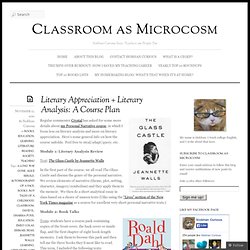
Here’s some general info on how the course unfolds. Feel free to steal/adapt/query, etc. Module 1: Literary Analysis Review Text: The Glass Castle by Jeannette Walls. Tone/Attitude Words. Library. As of July 1, 2013 ThinkQuest has been discontinued.

We would like to thank everyone for being a part of the ThinkQuest global community: Students - For your limitless creativity and innovation, which inspires us all. Teachers - For your passion in guiding students on their quest. Partners - For your unwavering support and evangelism. Parents - For supporting the use of technology not only as an instrument of learning, but as a means of creating knowledge. We encourage everyone to continue to “Think, Create and Collaborate,” unleashing the power of technology to teach, share, and inspire. Best wishes, The Oracle Education Foundation. Why I Write Poetry: A really good poem can reach kids in wondrous and unexpected ways.
Academics. HyperGrammar. Welcome to HyperGrammar electronic grammar course at the University of Ottawa's Writing Centre.
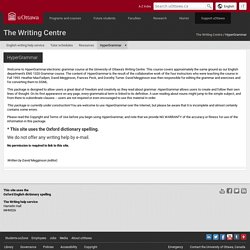
This course covers approximately the same ground as our English department's ENG 1320 Grammar course. Soople.